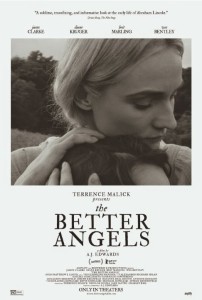Terrence Malick is a filmmaker who marches to the beat of his own drum. His unorthodox work has made audiences ponder, and his unique direction and screenwriting has challenged the actors he’s worked with. He’s certainly a one-of-a-kind with a sixth sense for beauty.
I imagine collaborating under his mentorship would provide an artful view of how to express yourself using poetic language and imagery. However, the point of being a protege is for that specific apprentice to draw influences from their admired hero, and use those new skills to find their own individual voice. A.J. Edwards was that collaborator and that hero was Malick. And, although his directorial debut packs all the serenity of Malick, Edwards’ film is strictly – and sadly – all surface.
The Better Angels looks and sounds the part, but everything is almost too uncanny. Instead of Edwards breaking out of his own shell, his final product is a loose copycat of Malick’s abstract storytelling and hovering camerawork.
The Better Angels is, at least, a gorgeous experience. One could randomly extract frames out of Edwards’ film and fill a gallery with Matthew J. Lloyd’s cinematography. The film takes place in 1817, and the camerawork captures the open void of Indiana’s empty fields and endless forestry. As we’ve seen in recent Malick movies like To The Wonder and The Tree of Life, the lens flies towards the characters; giving a personal and raw look from different perspectives. Edwards may be playing someone else’s song, but he and Lloyd know how to play the instrument.
But, the film has diminishing confidence and a lack of honest sincerity within the autobiographical content describing a young Abraham Lincoln’s difficult upbringing. But once again, the film plays safely by choosing to duplicate someone else’s work rather than taking a life of its own.
Words are hardly heard, except through consistent narration based on reenacted interviews from Lincoln’s family. The silent activity that makes up the rest of the film catches an adolescent, confused view of the world as Lincoln hopes for acceptation. There’s an abundance of those moments reflecting Abe’s feelings of neglect as he latches on to a Mother figure, but the performances are efficient with collecting empathy.
Even if his work is catered to an acquired taste, it’s comprehendible that Malick has a way of delivering an interesting narrative along with his opulent images and conceptual whispers. As The Better Angels became more of a dull one-trick pony through droopy pacing and toothless filmmaking, it’s clear that Edwards is still figuring out the tricks to his mentor’s enigmatic trade.





Be the first to comment